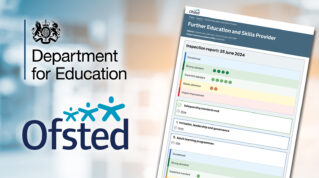Over the past 18 months, the Ofsted inspectorate has demonstrated a commitment to redefine its approach, fostering greater trust across the sector.
We members of the Fellowship of Inspection Nominees (FIN) appreciate its evolving transparency and improvements.
In its response to the watchdog’s latest consultation, FIN welcomes written confirmation of a five-day notice period for inspections for all providers. This was among our recommendations during the Big Listen.
To better understand sector sentiment, FIN, alongside the University Vocational Awards Council (UVAC), conducted a survey on Ofsted’s proposals. It revealed strong support for the introduction of report cards, albeit with notable concerns. Providers fear inconsistencies in how inspectors differentiate between secure and strong grades and their own ability to self-assess, based on the current draft toolkit and without detailed new operating guides for inspectors.
We must ensure the new exemplary grade is both meaningful and attainable. Providers and inspectors alike must have a shared understanding of what exemplary practice entails to promote excellence effectively.
A key concern remains the ability of sector non-specialist inspectors lacking confidence to identify and award ‘exemplary’ within specialised fields. There’s a risk that important contributions could be overlooked.
As one of the most debated topics in FIN’s consultation roundtables, members really hope the intention is to highlight best practice to celebrate the huge impact FE has on learning and skills and for government recognition.
FIN advocates for high quality and will actively encourage members to showcase strong examples during inspections rather than leaving identification solely to inspectors. In turn, inspection teams must be fully equipped and tasked with proactively seeking out best practice in every organisation they assess.
Given that report cards will be the only written output from inspections, FIN members are seeking assurances that accompanying narratives will adequately justify assigned grades. Ofsted reports should be valuable not only for providers but also for employers and prospective employees, offering clear insights into the quality of the training.
While FIN is broadly comfortable with the five-point grading scale, members have questioned its selective application. For example, grading is limited for safeguarding, raising concerns that Ofsted’s approach could rely too heavily on learners’ perceptions of a provider’s responsiveness rather than evidence-based assessments.
The integrity of the grading process must be preserved to ensure judgments remain objective and substantiated.
There is also support for independent training providers, HE and employer providers to be graded as exemplary on their ability to meet local skills needs, a long-standing strength of the wider sector that deserves recognition.
FE providers cater to a diverse range of learners, making it essential for inspectors to assess broader outcomes beyond qualifications. Personal development, workplace impact and career progression, including promotions, should all form part of the evaluation process. Measuring progress from a learner’s starting point and recognising distance travelled as a critical achievement will be key.
While the inclusion agenda is widely accepted, one FIN member posed an interesting question: “Isn’t this what we do every day?” Nonetheless, the majority of survey respondents agreed that inclusion should form part of the new framework, provided Ofsted establishes a clear definition and consistent guidelines to ensure fairness across all types of providers.
The careers guidance aspect of the toolkit is well written. FIN believes employer providers and indeed all providers should be celebrated and recognised for fostering internal promotions contributing to sustained employment and improving attrition rates.
The new operating guide must also explicitly reference functional skills. Inspectors will continue to assess how providers are delivering improvements in maths and English, but it’s important Ofsted recognises that this may not be funded, particularly in light of the removal of exit requirements for apprentices aged 19 and over.
Lastly, the FIN survey uncovered overwhelming support for embedding external challenge within provider governance structures – a move that will strengthen accountability and sector-wide improvement.
Overall, FIN members see the proposed reforms as positive steps. However, Ofsted has for some time widened its scope, way beyond what providers are actually funded to deliver. There is an underlying concern that the inspectorate leans too heavily toward younger learners, potentially sidelining the needs of those already in employment and seeking career progression.















There has always been a huge problem with the knowledge and skills of inspectors, even in the days of inspectorates that paid attention to it such as FEFC, TSC and the ALI. In moderating observation forms of practical skills teaching I have had to ask why an observation is not outstanding or even more worrying inadequate? Ofsted answer get rid of graded observations so you can’t be challenged on your evidence base. Ditto no text on safeguarding in case of challenge, rather than give useful improvement information. If you are a hospitality, care, hair or engineering provider you need not only the right skilled inspectors to make practical judgements, but also to ask the right reasoned questions about curriculum and also health and safety. The latter should really worry a chief inspector if there is a serious safety problem a week after an inspection that is not picked up. Key is recruiting the right inspectors with vocational expertise and then deploying them to inspections that require their skills. It can be done but Ofsted do not accept the need to do so. I have a letter from an HMI writing to a CEO appealing about the work-based expertise of their inspection team stating that if an Ofsted inspector had been on one WBL inspection they have the required expertise. An arrogant and misplaced attitude.